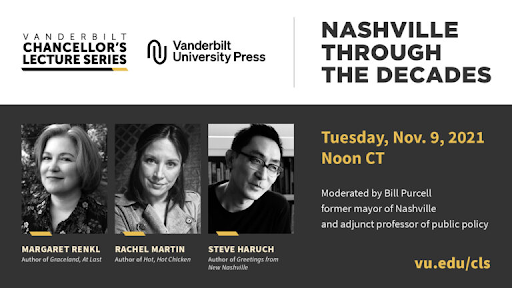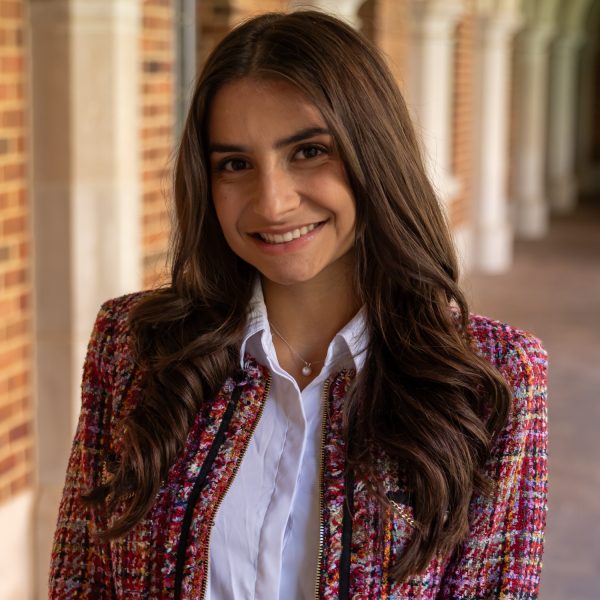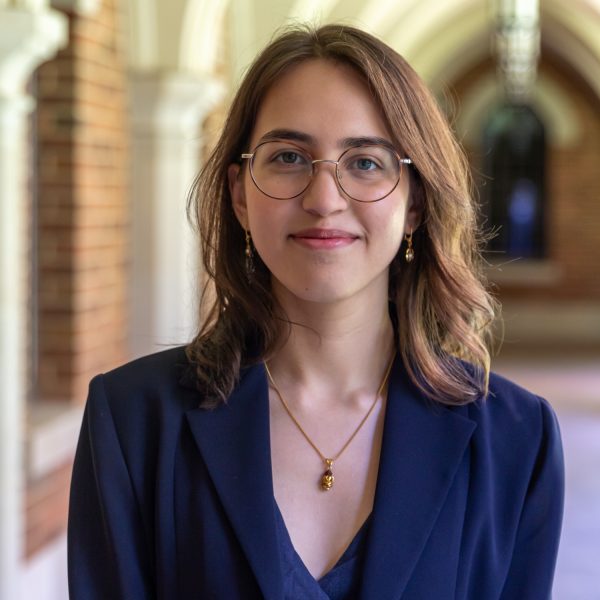On Oct. 27, The Hustler spoke with author and New York Times columnist Margaret Renkl about her writing, Southern culture and the Vanderbilt experience.
Renkl is the author of “Late Migrations: A Natural History of Love and Loss,” and her latest book, “Graceland, At Last: Notes on Hope and Heartache From the American South.” She writes about policies and culture in the American South for The New York Times.
As a speaker for a Nov. 9 panel titled “Nashville Through the Decades” hosted by the Chancellor’s Lecture Series in partnership with Vanderbilt University Press, Renkl spoke on perceptions of Southern culture, politics and more.
The Hustler: Much of your work focuses on multifaceted presentations of the South. From social justice to the environment to faith, how do you reconcile the positive and negative aspects of all of these different ideas?
Renkl: People are inherently self-contradictory. I think that it’s helpful to think about human beings in general with that recognition in mind. All people are in some way maddening, as all people are in some way inspiring. That is really no different with my work, trying to make it make sense. I’m just trying to present as multifaceted and complex a picture as I can. I think we live in an age where it’s too easy to see the simple and what we need is a recognition of complexity.
We noticed on your Twitter feed that you support the work of the Tennessee Environmental Council and Yale Environment 360, among other organizations which attempt to preserve the natural environment of the South, in part by promoting divestment from fossil fuels. How important do you think it is for Vanderbilt, being a prominent university in Tennessee and a model for Southern universities, to divest from fossil fuels? What responsibility does the university hold in maintaining the natural Southern landscape?
I have to correct the record a little bit here. What I Tweet should not necessarily be construed as supporting. I write for a newspaper that requires me to be very conscientious about keeping my political positions very separate from my work. It’s a strange place to be an opinion writer, even if I can go on the record as a supporter of the issues that nonprofit works in favor of.
It was a report that shows a direct relationship between the financial investments in the fossil fuel industry and change on the part of that industry. I don’t think that that is in any way a surprise. In the kind of economy we have, pressures can be brought to bear on companies and those that are going to respond. If advertisers, for example, were to withdraw from Facebook, Facebook would change, even without regulation on the part of the federal government. If the fossil fuel industry is going to pivot away from the burning of fossil fuels or the creation of plastic to other forms of energy, it will do so because of economic pressures brought to bear by shareholders and consumers. That’s not an innovative position to take. That’s just a fact of how capitalism works.
If Vanderbilt were to divest from the fossil fuel industry, and if Vanderbilt were part of a divestment process by all universities, I don’t think that that would be a very innovative position to take. Do I think Vanderbilt should do that? I don’t think that’s for me to say. It’s for you to say.
How would you describe the shift in Southern culture to someone who has spent minimal time in the South?
I would say that the South changes in the way everything changes over time. The South that you are experiencing and the South I grew up in—I’m about 40 years older than you are, so it’s a pretty big difference—are very different. One of the differences is that the great Industrial Revolution of the 19th century by and large left the South behind. I think we all know why—it was related to the fact that the South was an Agrarian society and that society was driven in large part by enslaved people, not by machinery. So the South remains kind of rural relative to the industrialized North, for example, in part because of our shameful history, but that is changing.
What you see in Tennessee, over and over and over again, are companies coming from the industrialized North and more and more urban culture that you will not see in a lot of neighbors of Nashville. But in terms of people, we are not that remarkably different from people who live in cities outside the South.
In your opinion, what makes the South the most different from other parts of the country, such as New England, where I’m from?
That’s a question that gets asked a lot, especially among writers. We still have Southern literature, which I’ve always just kind of taken the position that is enriched and enlarged by as many diverse voices as it can involve. The traditional thinking about what it means to be a Southern writer—which is kind of related to what your question is—is that all about sweet tea and slamming screen doors anymore? I don’t know if that answers your question, but that’s the framework within which I think of that whole question.
How would you suggest that Vanderbilt students—many of which may only live in the South during college—maximize their time in the South?
Where Vanderbilt is located, I think it’s easy to never really step outside of that little world. That’s not a bad thing altogether. It’s just human nature. We try to set up our lives to be manageable. To maximize your time, you need to see the parts of Nashville that aren’t part of your town or your academic pursuit, whatever it might be. There’s some wonderful guide books, too—for example, civil rights monuments and really beautiful hikes in the Middle Tennessee area. We have some of the most beautiful land in the country here, up on the Cumberland Plateau especially. Just try to step outside whatever your community is to experience other communities. We have so many weird little festivals in Middle Tennessee, like Mule Day. Set yourself up for the kind of field trips your teachers would have taken you on if you were still in high school.
Are there any perceptions of the South that you hope to correct through your work? What do you hope “outsiders” understand about the South?
We want people to understand that not all people in the South are racist. That would be a start. People only understand that picture that’s presented of the American South through popular media, whether that’s TV shows, old TV shows like Andy Griffith or more recent ones like “Nashville.” In some ways, their stereotypes become stereotypes because they have a kernel of truth in them. Of course there are virulent racists down here, but there are also racists in Boston.
I think people don’t have any idea how diverse the South has become and the amount of different immigrant communities here. They are crucial members of the community. I don’t think people understand what a strong LGBTQ population there is here and how they are an important part of our community. There are a lot of different types of people out here, and they are interested in a lot of different paths.
Your writing style mainly consists of essays and micro-biographies that include personal narratives about your family. Why do you think this format allows you to tell the stories of the South more effectively? How does it feel to be vulnerable in sharing these experiences with your readers, especially since you write for such a well-read publication?
I think if I had started doing this kind of writing when I was your age, I would probably be destroyed by the end. There are things that women are not allowed to say online that men can say without raising eyebrows. The way that women who dare to express an opinion are attacked online can be terrifying. But I’m not afraid because most people who are hateful are just hiding behind a pseudonym online. For better and for worse, I don’t live in a bubble. I am in close contact with people who don’t agree with me and who get very angry with me. And that’s okay.
What is your favorite part of the South?
This is kind of a cop-out answer, but I love talking to people in the South. My favorite part of this work is that I can go down to a Trump rally and get to actually talk to people who’ve stood in line since three in the morning so that they’ll have a seat in the aquarium. It’s all about interesting conversations—that I can talk to people when I’m walking my dog.
People are so endlessly fascinating and often open. We don’t ask enough questions in our daily lives. People are desperate for somebody to show interest in and be curious about their thoughts and experiences. It reminds me again and again that I need to be a better listener in my actual life because we all seem desperate to be heard.
This piece has been edited for brevity and clarity.

















